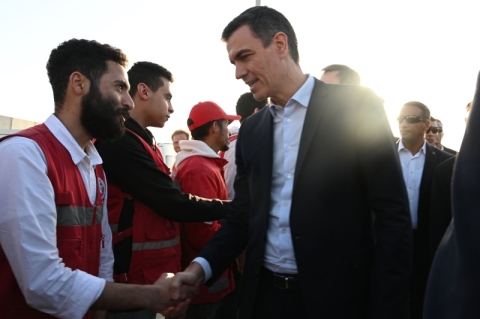Politics
Israel opens a diplomatic crisis with Spain
It accuses of “supporting terrorism"
USPA NEWS -
The Government of Israel called the Spanish ambassador in Tel Aviv for consultations this Friday, to reproach her for the alleged Spanish support for Hamas terrorism and to warn her of the consequences for relations between both countries if Spain does not change its attitude. Since the war between Israel and Hamas began, the Tel Aviv Government has been very upset by the attacks received from the far-left partners of the Spanish Government.
Israel considers these attacks “anti-Jewish” and demands that the Government of the Spanish Prime Minister, Pedro Sanchez, disavow its far-left partners. The Government of Israel accuses the Spanish Prime Minister of “supporting terrorism” by Hamas. But Sanchez has always distanced himself from these attacks, emphasizing that he does not share the opinion of his partners. An explanation that has not convinced the Israeli Government, which after the visit that the Spanish Prime Minister made to Jerusalem on Thursday, where he met with Benjamin Netanyahu and the Palestinian National Authority, before whom he defended the two-state solution and urged Israel to defend itself within international legality. And the Spanish Minister of Foreign Affairs, Jose Manuel Albares, “flatly” rejected the Israeli accusations against Sanchez this Friday.
This Friday, in Egypt, where he visited the Rafah border crossing, Pedro Sanchez affirmed that the response to terrorist acts cannot be the death of civilians in Gaza, including thousands of children, and highlighted the importance of continuing to advance so that humanitarian aid enters Gaza on a large scale and regularly. Likewise, he welcomed the agreement to release the hostages and to establish a humanitarian pause, and expressed his hope that this fact will lay the foundations for reaching a lasting humanitarian ceasefire. "We must take the necessary steps towards this humanitarian and lasting ceasefire," explained Pedro Sanchez. "This is what we ask of the Israeli authorities, with whom we have had sincere exchanges."
Two meetings
On Thursday, Sanchez held a meeting in Jerusalem with the President of Israel, Isaac Herzog, and the Prime Minister, Benjamin Netanyahu, and President Sanchez was able to convey his condolences and condemnation of the terrorist attacks. Since the beginning of this crisis, and on numerous occasions, the Government of Spain has conveyed its demand for the immediate and unconditional release of all hostages, and Israel's right to defend itself in accordance with international law and international humanitarian law.
Pedro Sanchez stressed both points during the his meetings, and conveyed to the Israeli President and Prime Minister his concern about the terrible situation in Gaza. "The response must not involve the death of innocent people in Gaza, including thousands of children," said the Spanish President, who also defended the two-state solution as "the best way to defeat terrorism and guarantee Israel's security". Pedro Sanchez has thereby conveyed Spain's proposal for an international peace conference with the parties involved, an initiative that already enjoys broad international support.
With Mahmoud Abbas, Sanchez held a bilateral meeting last October, on the occasion of the Cairo Summit for Peace. On this occasion, he reiterated his willingness to move towards the two-state solution, Palestine and Israel, to realise the legitimate aspirations of the Palestinian people for an independent, viable state that coexists in peace and security alongside the State of Israel.
During the meeting, Pedro Sanchez also expressed his satisfaction with the agreement that will allow the release of hostages and a pause that will enable humanitarian aid to enter Gaza. In this context, he shared with Mahmoud Abad his desire for a lasting humanitarian ceasefire, and expressed his willingness to work with the Palestinian Authority to end this cycle of violence and build a lasting peace.
Liability for this article lies with the author, who also holds the copyright. Editorial content from USPA may be quoted on other websites as long as the quote comprises no more than 5% of the entire text, is marked as such and the source is named (via hyperlink).






